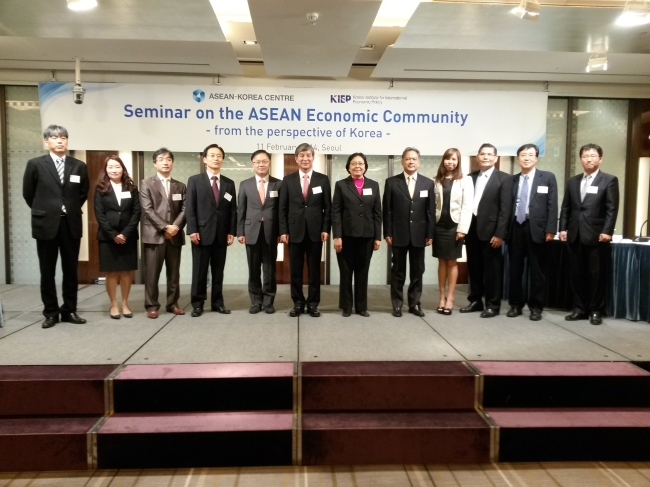Southeast Asia, Korea discuss impact of regional bloc
By Korea HeraldPublished : Feb. 16, 2014 - 19:46

Diplomats of South Korea and Southeast Asian nations, as well as a coterie of experts and researchers, convened in Seoul on Tuesday to discuss what a European Union-style ASEAN trade bloc will mean for South Korea when it officially comes into force in 2015.
The day-long seminar on the ASEAN Economic Community from the perspective of South Korea opened with speeches by ASEAN-Korea Centre Secretary General Chung Hae-moon and Malaysian Ambassador to South Korea Dato Rohana Ramli, who is chair of ASEAN here.
“It is hoped the community would bring a new era of economic dynamism and resilience in Southeast Asia and create a new vibrancy and bridge on the economic landscape of East Asia which could pave the way in promoting cooperation between Southeast Asia and Northeast Asia in general and ASEAN and South Korea in particular,” Chung said in opening remarks on Tuesday.
The ASEAN Economic Community will go into force in 2015, but the six member states with the largest economies have been gradually reducing tariffs on goods since 2007 with the goal of eliminating all duties by 2015.
The four member states with smaller and weaker economies ― Cambodia, Laos, Vietnam and Myanmar ― were given more time and wiggle room in meeting their treaty obligations.
South Korea benefits from all this as a signatory to an ASEAN Plus One trade agreement. The Southeast Asian regional group has agreements with five others, including China, Japan, India, Australia and New Zealand. South Korea’s FTA with ASEAN went into effect in 2007.
ASEAN has become South Korea’s second-largest trading partner in large part because of the FTA signed with the regional body. Their bilateral trade volume was $135 billion in 2013, $4 billion more than what it was in 2012.
Chung said the government estimates an increased trade volume of $150 billion by 2015 by “fully utilizing the ASEAN-Korea FTA.”
This year marks the 25th anniversary of ties between South Korea and ASEAN, said Dato Rohana Ramli in her opening remarks.
“Since then 25 years have passed and ASEAN-Korean relations have strengthened and blossomed throughout these years. Under political and security, Korea is a key partner in ASEAN Plus Three, East Asia Summit and the ASEAN Regional Summit and the ASEAN Defense Ministerial meetings. In trade and investment, ASEAN are important partners. Korea is ASEAN’s third-largest trade partner,” she said.
(ephilip2011@heraldcorp.com)
-
Articles by Korea Herald








![[Today’s K-pop] BTS pop-up event to come to Seoul](http://res.heraldm.com/phpwas/restmb_idxmake.php?idx=644&simg=/content/image/2024/04/17/20240417050734_0.jpg&u=)

![[Graphic News] More Koreans say they plan long-distance trips this year](http://res.heraldm.com/phpwas/restmb_idxmake.php?idx=644&simg=/content/image/2024/04/17/20240417050828_0.gif&u=)






![[KH Explains] Hyundai's full hybrid edge to pay off amid slow transition to pure EVs](http://res.heraldm.com/phpwas/restmb_idxmake.php?idx=652&simg=/content/image/2024/04/18/20240418050645_0.jpg&u=20240419100350)

